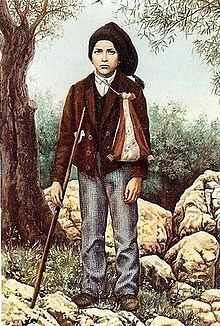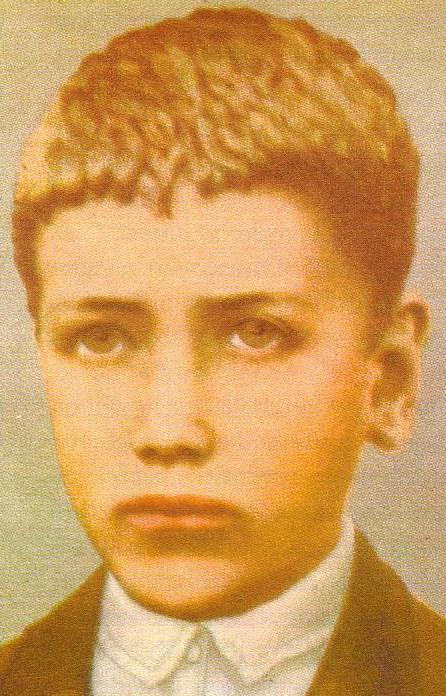When we last looked at Fatima, it was the death of little Jacinta Marto -- youngest of the three seers.
Likewise incredible was her brother, Francisco, little also, for in 1919, when he died a year before she did, he was only ten years only.
This was a child whose spiritual maturity brought him beyond the competitions and frivolities of this passing world into a realm seen by few others in history.
For in the light shed by Mary Francisco had been given great insight into why eternity was what mattered.
That meant not criticizing others -- "poor sinners" -- but praying for them.
 Like Jacinta, he was keenly
focused on sacrifice; while Jacinta's seemed oriented mainly for those
sinners (to prevent them from descent into hell), Francisco's main focus --
although he also sacrificed for fellow humans -- was consoling God.
Like Jacinta, he was keenly
focused on sacrifice; while Jacinta's seemed oriented mainly for those
sinners (to prevent them from descent into hell), Francisco's main focus --
although he also sacrificed for fellow humans -- was consoling God.
For how God had been offended! How the Lord Jesus had! How the Blessed Mother felt the wounds!
Although, unlike the other two, little Francisco never heard words (did not hear Mary or the Angel of Peace speak, though he saw them), the boy was fully aware of what was said and had seen the fantastic light of God as it was shed through the Immaculate Heart to the earth.
That light, he noted, had gone two ways: with the Blessed Mother and Lucia radiating downward, for work on earth, and upward with him and sister Jacinta, for, as both siblings knew, they were soon to be taken into Heaven.
Like Jacinta, he had absolutely no fear of death.
And his hallmark: quiet.
This was a boy, truly, like no other.
 "Francisco spoke very
little," wrote Lucia in a series of memoirs during the 1930s and 1940s.
"He usually did everything he saw us doing, and rarely suggested anything
himself. During his illness, he suffered with heroic patience, without
ever letting the slightest moan or the least complaint escape his lips.
One day, shortly before his death, I asked him: 'Are you suffering a lot,
Francisco?' 'Yes, but I suffer it all for the love of Our Lord and Our
Lady.'"
"Francisco spoke very
little," wrote Lucia in a series of memoirs during the 1930s and 1940s.
"He usually did everything he saw us doing, and rarely suggested anything
himself. During his illness, he suffered with heroic patience, without
ever letting the slightest moan or the least complaint escape his lips.
One day, shortly before his death, I asked him: 'Are you suffering a lot,
Francisco?' 'Yes, but I suffer it all for the love of Our Lord and Our
Lady.'"
The boy showed no love for dancing, especially in light of the serious visions -- including the one of hell -- they had seen. If other children insisted on taking something that was his, he simply said, "Let them have it! What do I care?" The same was true of games: he didn't care if he lost or won -- preferred seeing others the victors, if that's what they wanted.
What he cared about was communing with nature at the top of the high rock while he softly played a flute. "I love God," was the chorus of one song he played. "I love Him, too, on earth, I love the flowers of the field, I love the sheep on the mountains." It wounded the boy to see anyone rob a bird's nest, and when a another boy caught a small bird, Francisco ran home for coins to buy the bird's freedom. Reminding us of his namesake, Saint Francis, birds flocked around him.
After the monumental 1917 apparitions, Francisco often wandered alone behind brush for a wall or hours on end, constantly praying the Rosary. "Our Lady told us that we would have much to suffer, but I don't mind," he said. "I'll suffer all that she wishes! What I want is to go to Heaven!"
What hurt Francisco the most, when influenza prevented him from attending church, was the inability to spend time with the "Hidden Jesus" in the Blessed Sacrament.
He was felled by the same flu as his sister in an epidemic -- a hidden chastisement -- that killed fifty to a hundred million worldwide.
At
times his headaches
were such that he asked Jacinta and Lucia (who was his older cousin) not
to talk too much.
Yet the suffering he gladly offered as a way of consoling Our Lady, who had seemed to him to be so sad.
While the famous vision of hell -- related as the first Fatima secret -- did not affect the boy as much as the two female visionaries, Francisco was badly shaken by the appearance of a demon after the apparitions. "It was one of those huge beasts that we saw in hell," he told Lucia. "He was right here breathing out flames!"
If that was a jolt, the approach of death still left him undaunted. The day before he passed, the boy told Lucia, "Look! I am very ill; it wont be long now before I go to Heaven." He had requested the sacrament of Reconciliation. "I am going to Confession so that I can receive Holy Communion, and then die," said the child, asking Lucia and Jacinta to remember for him any sins he may have committed and forgotten (which they gladly did!).
What made the most powerful impression on him and what wholly absorbed him, wrote Lucia, was God, the Most Holy Trinity, "perceived in that light which penetrated our inmost souls..."
"Goodbye, Francisco!" said Lucia, knowing she would live for many years on earth serving God. "If you go to Heaven tonight, don't forget me when you get there, do you hear me?" As the scene became moving, Lucia was nudged from the room by her aunt. "Goodbye then, Francisco!" she said to this boy who would always remain one of the very closest humans to her heart -- unforgettable right to her own death more than eight decades later. "Till we meet in Heaven, goodbye!..."
And so it ended.
[resources: Lenten books and books on Fatima]
